Your Cart is Empty
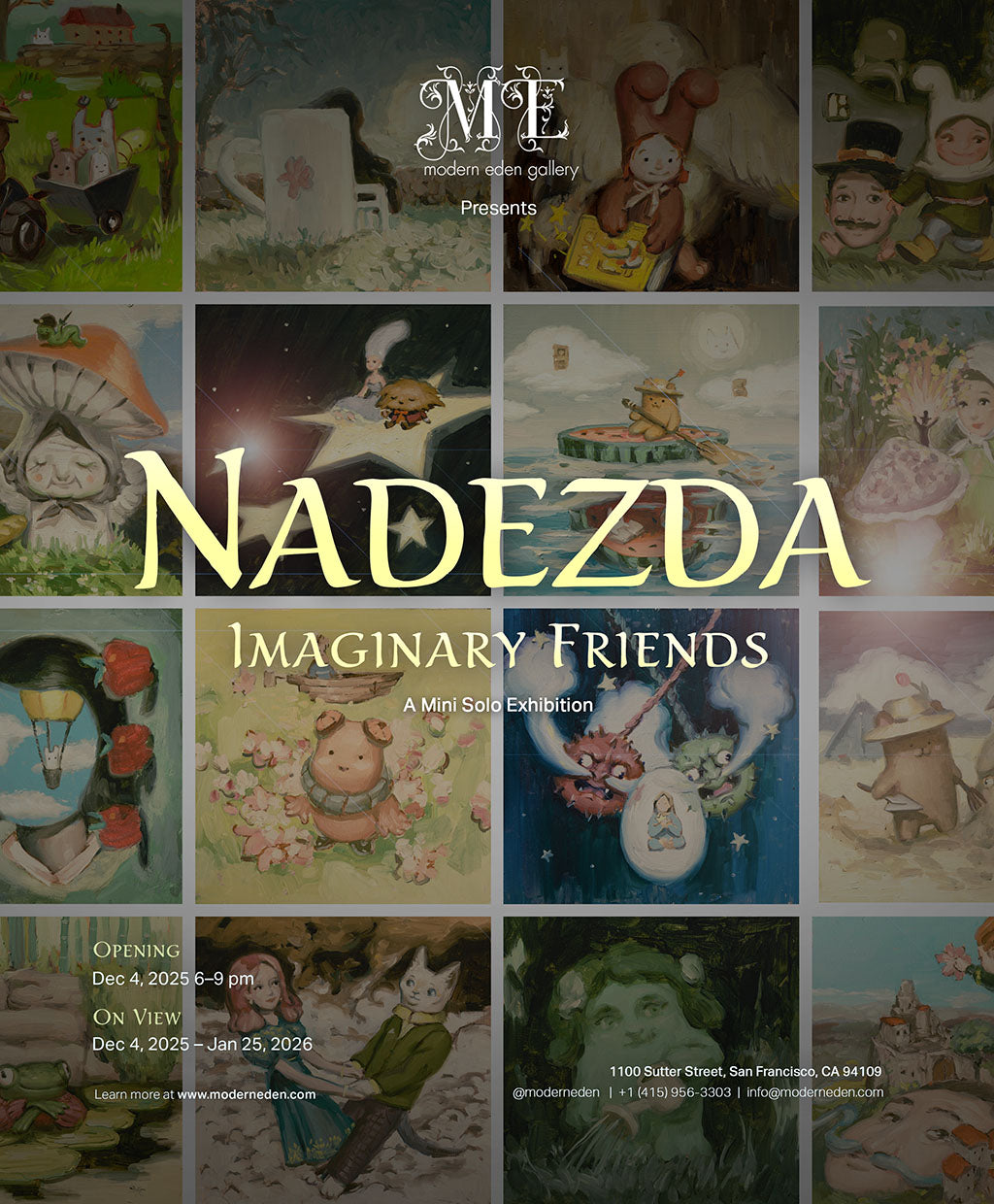
Nadezda: Imaginary Friends
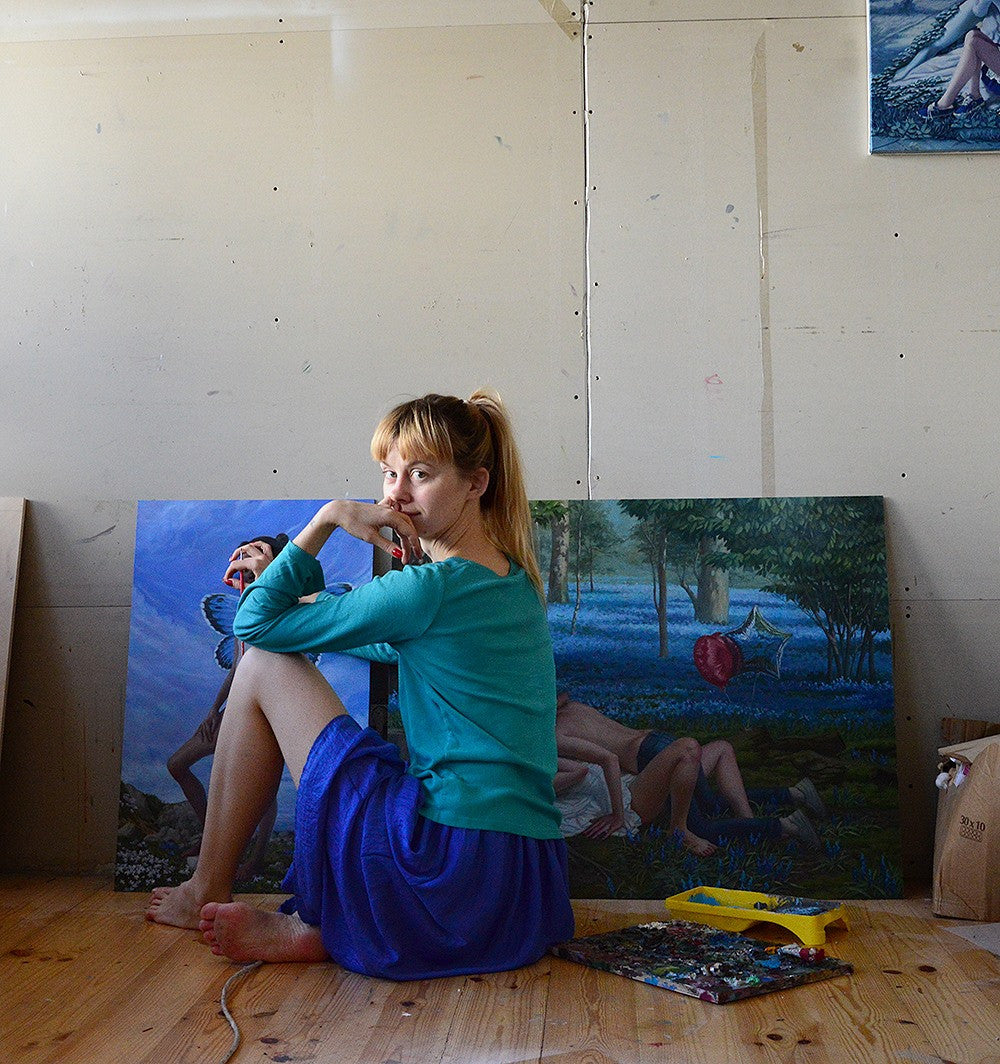
July 28, 2016 9 min read
This August brings the San Francisco debut and the gallery’s first major solo exhibition of new works by Latvian artist Jana Brike. Fifteen new oil paintings will be on exhibition, including several major works on aluminum that stand out as some of the finest pieces in the artist’s respectable oeuvre. In 'Superabundance', the artist is in her stride, working with a deft hand, she weaves a soft and supple, hyper-visual narrative. Her dream-like subjects are wrapped within the forest’s lurid color and pattern, where certain revelations are both discovered and feared. The works explore the overwhelming range of emotions, from the innocent to the ecstatic, sorrow to joy, and peak at the place where sensationally charged beauty meets a dangerous and wild nature.
Interview by Jessica Violetta

JV: Your new series, Superabundance of Ordinary Being, appears to still capture the beauty and innocence of your previous works but also feature a much more obvious reference to female sexuality. Was this intentional and, if so, what was the driving force behind that imagery?
JB: There is always this juxtaposition of two sides. One is being “sexy” or an object for the viewer. The other is a sexuality that is deeply internal, inherent, and almost primeval that comes from a sacred, creative force. More like a physical self-awareness that I believe exists in all things alive in this universe, non-dependent of a partner or a viewer.
The first one is what I feel is expected from a woman. It is like there is a prism through which society filters images of women that often surprises and even scares me.
But the second is all still heavily tabooed: female sexuality strongly centered within itself, with its wisdom of nature cycles, unapologetic with no obligation. It has no wish to concede or show off but to simply exist within the female body as it is – with its blood, sweat, milk, fur, marks of childbearing, and marks of aging.
I believe this awareness and understanding is part of the real self-power for a woman. This is not what I paint directly, but it is the climate in which I have grown to be a woman, and aim to come to terms with in my own body and self. I am honestly just starting to find out what it even means to be woman as a vessel for the female energy of everything living rather than simply what society defines my role as (ie. mother, wife or lover). I am still on a path of discovery toward being a woman internally, and the sacredness of it. And these discoveries are so deeply experiential that they are beyond verbal description.

JV: Another interesting new detail that we noticed is your use of imaginative “tattoo”-like drawings on the skin of the figures or animals in the artwork. Is there symbolism behind this for you?
JB: Yes, skin is a big and important organ that is both a wall of protection and an important interaction with our external environment. It is like an imagined border. Therefore, painting the skin of my characters has always been important to me. All the little details - hair, scratches, bruises, pimples, moles, scars, bluish or red blood-vessels, dirt, cosmetics and now lately…drawings. I just find it fascinating how drawing on skin is used to convey a message – with tattoos existing from the beginning of civilization, kids scribbling all over themselves, or the way a young girl would write a boy’s name on a secret spot of her body after first discovering affection. It is like externally displaying what is going on inside, as if you can’t hold it in any longer. Important stepping-stones, interactions, revelations, or discoveries leave permanent marks inside of you and are now being shown to the world to be “read” like a book.

JV: This series features several pieces where more than one figure is in the scene. Is there a significance in the interaction between the characters?
JB: There are, of course, times where you just need another. It is not a need so desperate that you are incomplete without them but rather a need that derives from their ability to bring out certain properties in you that are hidden yet full of goodness and potential - catalysts for your experiences, understandings, feelings, and new beginnings. But the number one relationship in life is with the self and all external relationships just grow out from there. I honestly believe that no other person can give you what you haven’t already developed within you. So the vast majority of my paintings feature just one figure, one human, and their environment.
I painted this entire series while in an extremely difficult internal place. I have had to come to terms with receiving negligence, rejection, and a lack of love as extreme opposition to my own offering of true love, daring to be open, and vulnerability of one soul to another. And while I consider it to be sacred to connect with another soul, it is cast away by the recipient like disposable excess in a world full of competition for achievement, without even a few kind words. Being in this place has felt like hitting rock bottom of everything I used to believe in. Risking and losing it all completely has left me with the same broken self as before, numb in disbelief, and an impossible mission to find ways to love that rejected self and the beauty and worth of it regardless of external acknowledgement. In that place, even the idea that you can learn from every experience is shattered, because what is there to even learn here? Is it a survivalist lesson that you should not love so sincerely anymore? No way.
But I’ve learned what may be the ultimate lesson – the fact that life breaks us and it hurts. And not even solitude can save us because the yearning for expansion, sharing, and adventure break us just as badly. So we dance the dance of life, fall, and get back up when we can, dance again, sometimes with broken legs or arms or hearts, and if we open our eyes, we see that the whole world is a part of the same broken dance. The flowers are wasting their sweet petals and the fruit is wasting their sweet flesh, decaying and turning into new life in a bittersweet cycle and when we look long enough, we start to notice that we are not just the dancer, but also the music, the space in which it is happening, as well as the viewers watching it all happen.
It is pointless to complain and just wait for the world to be perfect before we really start living, because life will never be perfect and the only life is now.
I do not have all the answers, I am just on a journey like everyone else, and all I can say is that the superabundance of feelings and living a life through our human self, acknowledging that no one is singular or alone, allows us to all hold hands together. And I can’t convey all this through my paintings, but I believe they can connect some of these points through which our hearts meet most genuinely.

JV: You’ve been so kind as to share a glimpse of your studio and work process with us. Could you share a little more, in words, about the way you work and what your studio is like?
JB: In the wintertime, I am actually in the worst “hermit mode” and all time spent in the studio goes according to my personal ritual. I actually start by burning candles or a fragrance of some sort, do a short breathing meditation, eat very light, and work very long. I do that daily. In the summer I am much more flexible. Sometimes I paint outside by the countryside or travel with my smaller works and it is all way more playful. I don’t get as much done as the winter, but it helps me to not get burned out. My studio is a big mess when I am in the middle of working on a series. It starts with an overall feeling, state of mind and heart, and then the images come flashing in my mind. Then I sketch, gather reference material, and paint until I am happy with the emotional vibe it conveys.

JV: Do you typically work on one piece at a time or are there several in progress at one time?
JB: If it is a set for a solo exhibition, I work on them all at once. They are like chapters in one whole story, complete within themselves, but integral parts of a bigger picture. I need to work on them all together.

JV: Do you listen to music while you paint? What is your favorite?
JB: It depends on the phase of work. When I am working on the ideas, I like silence or just sounds of ordinary life around me. If I am just starting on a painting, where I’m still making decisions, I like classical music with ambient vibes like Chopin or Satie -something peaceful and beautiful. If I am painting things mechanically, which takes the longest, it can be many things –various kinds of music, audiobooks, lectures on countless subjects, and sometimes even movies.

JV: In all of your work to date, we see a clear and wondrous nod to childhood, innocence, and fantasy. Would you say that this is one of the biggest influences for your work?
JB: All the heroines of my current exhibition are young adults but I would agree that there is an aura of innocence, hope, and naive love and trust in them. I can’t say it is an “influence”, because “influence” suggests some external element that was not initially mine. It is more like a way of life through the things I search for and fall in love with in others – openness, rawness, an unguarded soul shining through – something I find to be way more common in children and more of a treasure in adults. There is an undeniable beauty in childhood, with its wish to touch the world in an unguarded way, its authenticity, and its hope and trust in things to come while fully living in the present. Adults are too fearful, armored, and protective of our personas. We lie and pretend and wear masks and are too guarded and disappointed to dream. I am not nostalgic though, because it is not the simple-mindedness or ignorance that I long for, but rather what I would call the “innocence of maturity”. It is a place where I have seen life, know what it brings, know that I can be broken by it, but still have goodness and the bravery to fall in love or dream. So my models are always adults in their late twenties or thirties at least, I just distort the proportions and the way the skin captures the light. I like to think that I paint portraits of souls more than bodies.
Maybe, somehow, I work with and heal my own emotional pain through this process of painting a return to innocence and I hope I do so for others as well. But it is all very intuitive and spontaneous, not fully conscious, and quite playful.

JV: So many of your pieces in this series seem to focus on a particular looking girl with light hair and eyes. Do any of your characters derive from real life relationships for you?
JB: That character is me, of course. I come from Latvia, North East Europe. There is nearly no racial diversity here. Historically, almost everybody has been tall and light. That is the look of the indigenous people here. The issues of social injustice and oppression have always been connected to nationality here and it has been important for me to understand what my personal heritage means. I always feel like I need to explain and apologize for that, particularly to my American audience. When I paint people of different looks, it gives me an opportunity to step back and feel things from a different perspective. I always need a live model though, so I paint important people I meet in my travels, who have let me photograph them.

JV: Your work is such an intriguing blend between fantasy, realism, and surrealism. Do you come up with the full scene before you begin or do you let the work speak to you as you go?
JB: A lot, truly, a lot of things – backgrounds, details, and sometimes even the main characters – change quite considerably while I work. I come up with more of a feeling that I want to convey before a fully developed scene. For this exhibition, it has been a certain vibe of painful sweetness, love, and longing in one overflowing heart. Sometimes certain images have been in my mind but I haven’t worked it out enough to put on canvas, so I have to rework it quite a bit. But I am happy with the final story it tells.
...
Jana Brike's Superabundance of Ordinary Being debuts August 5, 2016 at Modern Eden Gallery. The exhibition is on view through September 10, 2016.

Comments will be approved before showing up.
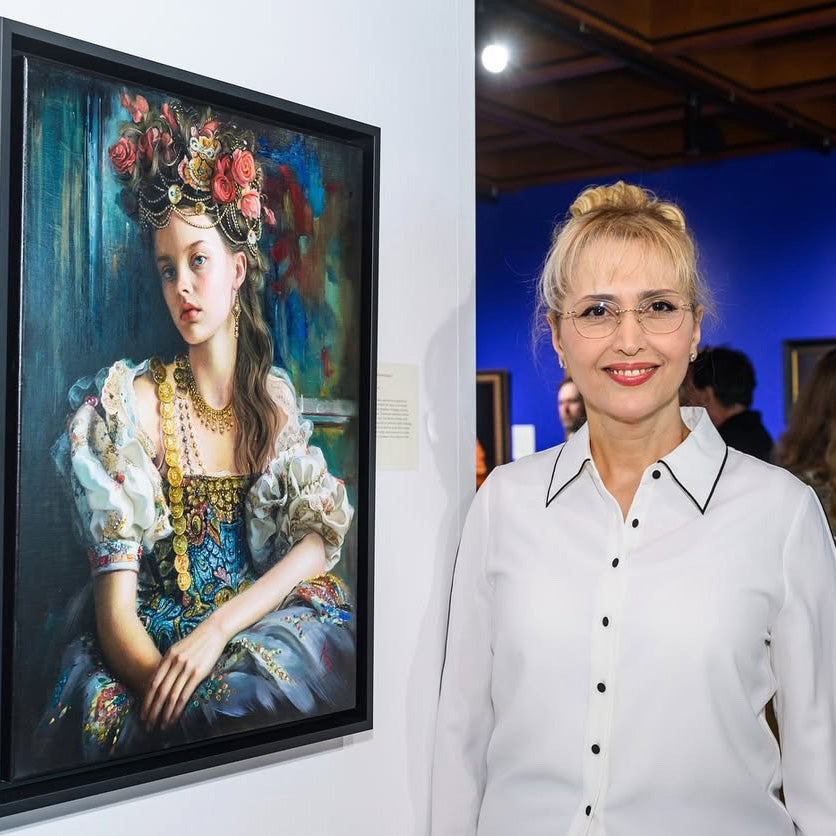
October 15, 2025 4 min read
In this interview, Alexandra Manukyan reflects on the dualities that define her practice: the weight of human grief carried through the female body, the interplay between concealment and truth, and the evolving tension between timeless tradition and our rapidly shifting digital age. What emerges is a portrait of an artist who paints not just figures, but the human condition itself—layered, vulnerable, and endlessly resilient.
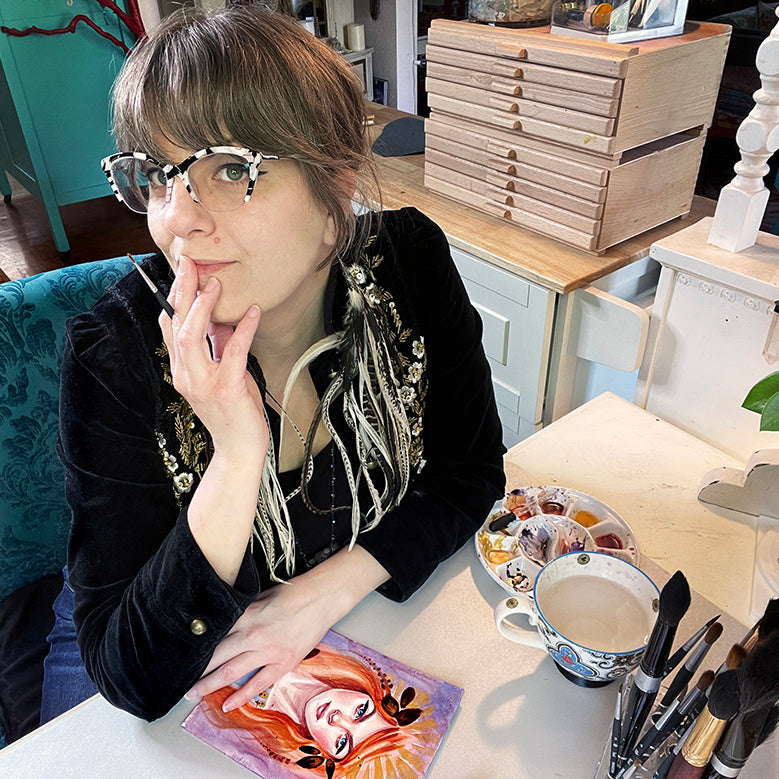
July 14, 2022 7 min read
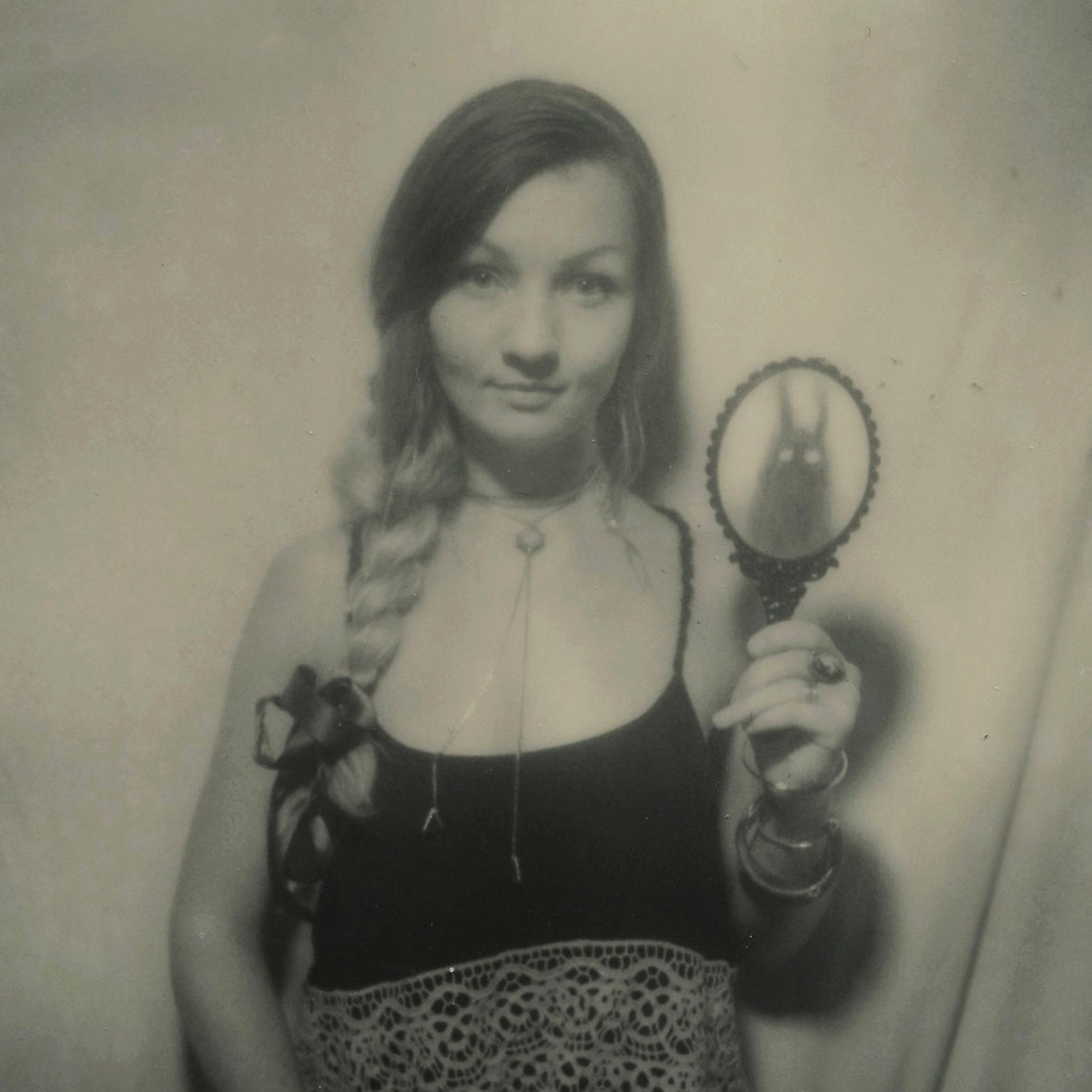
July 01, 2022 7 min read